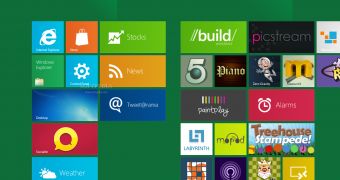What Windows 8 users will benefit from when accessing the upcoming Windows Store
is only one side of the entire story, while the other involves developers and why they should deliver apps for the portal.
For starters, it appears that they will be enjoying better revenues for successful apps in the storefront, while also benefitting from a more transparent certification process, as well as from impressive reach to users in a number of 231 markets around the world.
Developers interested in having their Metro-styled application distributed via the Windows Store will have to pay an individual registration fee of $49 USD (around 36 Euros), Microsoft announced, adding that companies will pay $99 USD (about 74 Euros).
The revenue share base for developers is of 70 percent, but that changes if the application proved successful.
“The revenue share base is 70%, but when an app achieves $25k USD in revenue—aggregated across all sales in every market—that app moves to 80% revenue share for the lifetime of that app,” Microsoft’s Ted Dworkin explains.
“So, once an app establishes a bit of success, we increase the revenue share to 80% to reflect and reward that success.”
The large Windows customer base that counts over 1.25 billion users at the moment represents a great opportunity for developers, Microsoft notes.
Moreover, the company notes that it already sold over 500 million licenses for Windows 7, which means that there are as many computers that could be upgraded to Windows 8 as soon as the platform is released.
“And when you look at the breadth of the Windows customer base, the potential for innovation on the platform and the appeal of new devices that take advantage of these software and hardware advances, we expect an entirely new scale of economic opportunity to be realized for app developers,” Dworkin notes.
As stated above, Microsoft has focused on app certification as well, and is determined to make it as simple and as transparent as possible. The app certification policies have been detailed here.
Developers interested in building apps for the platform will be able to take advantage of App Certification Kit and the SDK, both of which were delivered in Windows 8 Developer Preview.
The company also plans on providing developers with feedback on the reasons that determined it to reject an application or another. All this is meant to ensure quality and predictability in core app behaviors but also to foster innovation and new app experiences.
“The flexibility in our platform and Store model will result in creations we can’t possibly anticipate; this outcome is absolutely by design,” Dworkin explains.
“We want to provide a great path to market for that innovation. So the policies are living documents. When they change, we’ll publish a change log so developers don’t have to guess.”
There is also a new Windows Store Dashboard for devs to take advantage of, where they will see at which stage in the submission process their apps are. Application builders will also be provided with useful app telemetry data, so that they could improve the software.
“The dashboard will include the ability to view reports on downloads, revenue, usage, in-app transactions, customer ratings, market trends and crash data. These new reports will be consistent and actionable so developers can find and fix issues quickly and efficiently,” Microsoft explains.
The first apps will emerge in Windows Store is February, when the portal becomes accessible from the Windows 8 Beta platform release. At that time, only free applications will be made available for download.
Developers can download Windows 8 Developer Preview Build 8102 M3 now to get started.

 14 DAY TRIAL //
14 DAY TRIAL //